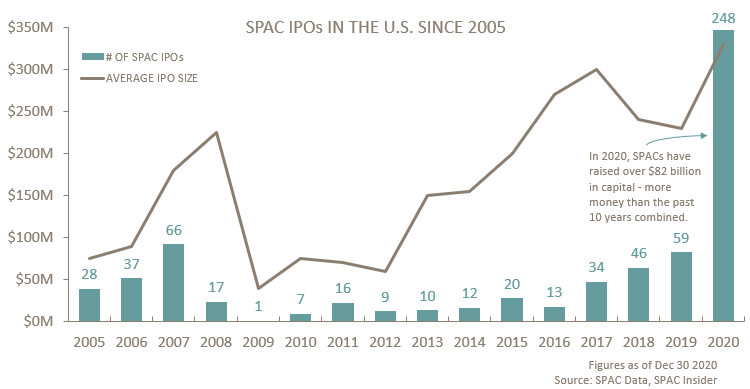Have you heard of Special Purpose Acquisition Companies (SPACs) before? They are not new and have been around for decades now! Thirty years ago, they became part of the capital markets landscape as an option for accessing public markets. Over the past two years, SPAC activity has garnered an overwhelming surge in popularity and conversation.
For perspective, in 2010, just seven SPACs came to market. In 2020, 248 new SPACs went public, an increase of more than 300% from 2019.

In this article we break down how SPACs work, their advantages, and Sandstone SPAC exposure.
why are spacs so popular?
SPACs provide investors with the opportunity to be part of newly public companies while hedging investor risk through the deal vote and capital return mechanism.
spac ipo vs. traditional ipo – What's the difference?
Let's start at the end and work backwards. The final result of both SPAC Initial Public Offerings (IPOs) and Traditional IPOs is the same – a private company becomes public.
The road to becoming public, however, differs.
Traditional IPO – a private company sells shares to the public in exchange for funding. An investment bank is selected to underwrite the deal. Typically, a "hot" offering is scooped up by large investors with connections (it's all about who you know).
In exchange, the investment bank receives a large payout commission. All documentation is filed with the Security Exchange Commission.
SPAC IPO – essentially a shell company (also known as a blank check company) raises investor capital to acquire an existing business and take it public.
spac sponsorship is key to success!
The most important aspect of investing in a SPAC is the sponsor. Experience, reputation and prior success provide the necessary confidence, and framework, to find and attract superior target companies. It's all about the network!
how do spacs work?
- A team of high-profile investors creates a SPAC intending to acquire/merge with a company in a specific area (i.e. health, EV technology etc.). The management team is known as the ‘SPAC sponsors.’
- The SPAC must register with the Security Exchange Commission.
- The SPAC raises capital from investors, typically at $10 per share.
- The funds raised are deposited into an interest-bearing trust account.
- The SPAC sponsors must identify a suitable company within two years after initiating the IPO. The search is for a private company that is of size, has the potential for lucrative growth, and good management to take public.
- Once a company has been identified, all SPAC shareholders must agree to the deal by a vote.
what are the advantages to spacs?
Now that you know how they work, it’s important for you to know the advantages of a SPAC:
- After the deal, SPAC shareholders have the option to redeem their shares in return for their initial investment or become shareholders of the newly public company.
- If the deal is successful, the SPAC sponsors and sometimes anchor investors have the opportunity to invest in the private investment in public equity (PIPE) deal (essentially at the SPAC IPO price after the deal is announced). This reward is dubbed the ‘promote’ and can be very lucrative for sponsors.
- If the deal is unsuccessful, the SPAC is liquidated, and shareholders receive their initial investment plus interest (which was held in trust).
sandstone spac exposure
There is no question that the unprecedented rise of the SPAC market is transforming and reshaping our capital markets. Here at Sandstone we have recently invested in one SPAC whose investment area is healthcare.
The sponsor is Rajiv Shukla, who has an extensive track record of buyouts and equity investments spanning over twenty years. He has served as Chairman & CEO of two successful Nasdaq-listed SPACs, one of which is the most successful healthcare SPAC transactions of all time.
Early in his career, Rajiv led global M&A for Pfizer Research and Development, where he was involved with nearly $65 billion in acquisitions. Subsequently, he worked as a hedge fund PM at Morgan Stanley and a private equity investor at CVCI before leading a 4,000-person team at a leading publicly listed engineering company as CEO. Rajiv has a Masters in Healthcare Management from Harvard University and a Bachelors in Pharmaceutics from the Indian Institute of Technology.
Bottom Line
While it’s impossible to predict with certainty how the SPAC appetite will ultimately evolve, the vehicle can offer a viable and expedited path for private companies looking to access growth capital and liquidity via the public markets.
For more information on SPACs contact us at SANDSTONE.